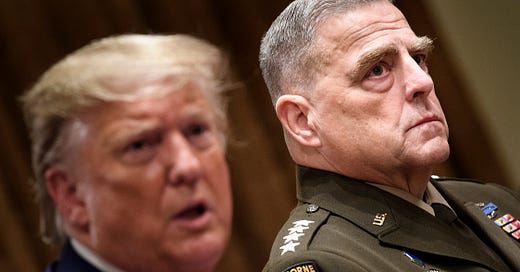The United States is an imperfect democracy in many areas but an absolute monarchy in one: nuclear policy. While presidents are held in check domestically, they have enormous and nearly unilateral power to launch wars, including nuclear wars. Yet to have the power of life and death of the entire planet rest on the shoulders of one person is inherently risky. Since World War II, the military has twice stepped in to prevent a the sitting president from suddenly launching nuclear war. Both instances took place during periods of constitutional crisis: in 1974 as the Watergate scandal was destroying Richard Nixon’s presidency and from November 2020 to January 2021 when Donald Trump’s attempts to rile up his followers looked perilously close to a coup.
A 2017 Politico article noted:
Moreover, Defense Secretary James Schlesinger recalled years later that in the final days of the Nixon presidency he had issued an unprecedented set of orders: If the president gave any nuclear launch order, military commanders should check with either him or Secretary of State Henry Kissinger before executing them. Schlesinger feared that the president, who seemed depressed and was drinking heavily, might order Armageddon. Nixon himself had stoked official fears during a meeting with congressmen during which he reportedly said, “I can go in my office and pick up a telephone, and in 25 minutes, millions of people will be dead.” Senator Alan Cranston had phoned Schlesinger, warning about “the need for keeping a berserk president from plunging us into a holocaust.”
On Tuesday, the Washington Post reported, in an article drawing from Bob Woodward and Robert Costa’s new book, Peril, that this same scenario was replicated under Trump with General Mark Milley, chairman of the Joint Chiefs of Staff, exercising proactive measures to fend off what he perceived of as dangerous acts by Trump:
The chairman, 62 at the time and chosen by Trump in 2018, believed the president had suffered a mental decline after the election, the authors write, a view he communicated to House Speaker Nancy Pelosi (D-Calif.) in a phone call on Jan. 8. He agreed with her evaluation that Trump was unstable, according to a call transcript obtained by the authors.
Believing that China could lash out if it felt at risk from an unpredictable and vengeful American president, Milley took action. The same day, he called the admiral overseeing the U.S. Indo-Pacific Command, the military unit responsible for Asia and the Pacific region, and recommended postponing the military exercises, according to the book. The admiral complied.
Milley also summoned senior officers to review the procedures for launching nuclear weapons, saying the president alone could give the order — but, crucially, that he, Milley, also had to be involved. Looking each in the eye, Milley asked the officers to affirm that they had understood, the authors write, in what he considered an “oath.”
The chairman knew that he was “pulling a Schlesinger,” the authors write, resorting to measures resembling the ones taken in August 1974 by James R. Schlesinger, the defense secretary at the time.
There’s much to say about this report, which has led to accusations that Milley, in response to Trump’s alleged attempted coup, launched a soft counter-coup of his own.
As with any book written by Woodward, it’s best to exercise caution about taking at face value any things that are said by anonymous sources. These sources often offer memories to highlight their heroic role in making history, which Woodward—as a practitioner of access journalism—is all too willing to present uncritically. It’s possible that there is some self-glorification going on here, not just for Milley, but also figures like CIA Director Gina Haspel (shown fearing that Trump would lead a “right-wing coup”) and former vice president Dan Quayle (portrayed as a source of guidance that helped Vice President Mike Pence resist Trump’s pressure to nullify the certification of the election). Thanks to Woodward and Costa’s reporting, all can now depict themselves not as Trump stooges but as heroes of a secret resistance.
Beyond the vague oath he extracted from senior officers, Milley seems to have played by the book in other matters of regulation. As Daniel Drezner argues in the Washington Post, if Milley was a more proactive military leader than most, it’s because of the space given to him by Trump’s incompetence and inattentiveness to detail.
Zeroing in on Trump and Milley misses the mark. The focus should be on the Republican Party and Congress. There are ample constitutional remedies for an unhinged and lawless president (impeachment and removal, the 25th amendment). These remedies are effectively moot if a political party with substantial seats in congress ties itself to a mad captain, as the GOP did under Trump.
The real story here is the dereliction of duty by congress, powered by GOP partisanship. Unless those problems are tackled, the USA will be living on the edge of volcano. The likelihood of coups and countercoups will remain. As Milley himself worried, America in 2021 might be like Russia in 1905: a nation where a failed revolt prefigures a much larger social upheaval.
(Edited by Emily M. Keeler)
Share and Subscribe
If you liked this post, please share:
Or subscribe:




